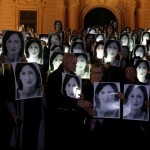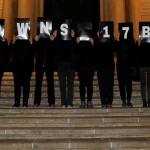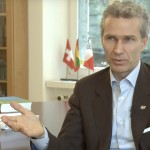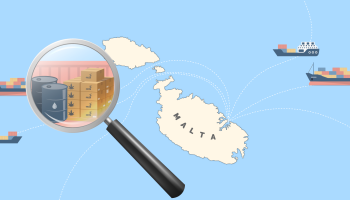The car bomb that killed Maltese journalist Daphne Caruana Galizia last year was detonated from a boat in the Grand Harbor near Valletta, the country’s capital, investigators say.
Despite three arrests in connection with the reporter’s killing six months ago, the ultimate motive remains unclear. Sources close to the investigation into her death told the Times of Malta that she had been looking into “the involvement of Maltese parties in a fuel-smuggling operation that included Libyan traffickers and Sicilian organized crime.”
In her blog, Running Commentary, Caruana Galizia had written that Malta’s underworld was becoming more violent, noting “an emerging pattern in which diesel smugglers are blown up by bombs in their car(s) while drug traffickers are shot by hitmen.”
Now 18 news organizations from 15 countries, including the Investigative Reporting Project Italy (IRPI), a partner of the Organized Crime and Corruption Reporting Project (OCCRP), have joined together to complete her work as part of the Daphne Project. The collaboration was organized by Forbidden Stories.
IRPI reporters have focused on a major Italian police investigation into how two unlikely partners — a beloved Maltese footballer and a Libyan militia chief — enlisted help from a man connected to the Sicilian mafia to develop a multi-million-euro business smuggling Libyan diesel throughout the Mediterranean.
Hundreds of Italian Financial Police files, corporate documents, and U.N. reports, as well as marine traffic data and corroborating interviews, paint a picture of how a modern fuel smuggling operation arose in Malta in the aftermath of Libya’s chaotic collapse in 2011.
The story of ambition, greed, and treachery illuminates how the Mediterranean fishing industry has become entwined with the far more profitable business of fuel smuggling. The profits the partners raked in from Turkey, Spain, Italy, and other destinations — as well as from Malta itself — remain unknown. But according to Italian authorities, the group made at least €26 million selling to just one Italian buyer.
In the end, the Maltese footballer, his Libyan partner, and two of their confederates were arrested, while a fifth man closely involved has not been charged and remains free in Malta.
Meanwhile, the drain on the Libyan nation continues.
“We estimate that between 30-40 percent of fuel produced and imported into Libya is stolen or smuggled, with a loss to the Libyan people in the order of a billion dinars a year (US$ 750 million),” Mustafa Sanalla, chairman of the Libyan National Oil Corp., said on April 18 in Geneva.
Just a Chat Between Partners
Professional smugglers usually know they could be wiretapped, which makes the following conversation about a small tanker vessel called the Basbosa and its illicit diesel transfers all the more remarkable:
“Good morning, malem [Arabic for boss], how are you? I'm in Italy! Sorry for yesterday, but we were out. All 100 percent fine on the Basbosa.”
“Is it ready?”
“Yeah, except 300 are still on it, because the Solia didn't take it all.”
“And those 300, can we send them with the Sea Master?”
“I’ll do that, you know? It arrives today at noon.”
The two men — former footballer Darren Debono and Libyan militia chief Fahmi Ben Khalifa — are discussing their smuggling business openly and without code words. They appear completely relaxed operating between a lawless Libya and a seemingly indifferent Malta.
They have no idea the Italian Financial Police are about to crack down.
The Basbosa is their small tanker, bringing smuggled fuel from Libya. That shipment will be split between their business partners’ ships — the Solia and the Sea Master X — and sold in Malta and beyond. It’s just one transaction in a trade that’s making the two partners millions of euros and supporting Ben Khalifa’s fiefdom in Libya.
At the time, Ben Khalifa was the local boss of Zuwara, a port city in Libya’s northwest corner. He operated there with the blessing of the area’s real masters — the brothers Mohamed and Walid Koshlaf — who a U.N. panel of experts describes as warlords and traffickers of both fuel and human beings.
On the other end of the call was Darren Debono, the Maltese former star of Valletta FC and a popular player on the national team. The 44-year-old owns other business interests on the island too: a tony seafood restaurant and a small fishing fleet. His stewardship of both showed a knack for innovation and a penchant for using his widespread connections to gain an edge.
Born into a National Party family, Debono had no trouble jumping to the Labour Party when it rose to power. At Scoglitti, his restaurant, he hosted glamorous parties and poured wine for legislators and ministers.
Fishing Ties to Cosa Nostra
According to an acquaintance, Debono ventured into the fishing business after a visit to the picturesque village of Marsaxlokk, where traditional rainbow-hued boats bob in the bay.
Records show a fishing business registered in the footballer’s name since at least 2000. Eventually, he bought four fishing boats and four support vessels to move the catch to shore.
Having built up his fleet, Debono needed a market — and this is where his Italian connections came in. At some point, he turned to Nicola Orazio Romeo, a Sicilian fish trader who investigators say opened the door to the market in Acireale, one of Italy’s largest.
The market has long been controlled by the Italian mafia — specifically, by a group allied with the Santapaola family, which rules the Catania province. That clan belongs to the infamous Cosa Nostra organized crime group in Sicily. Romeo is connected to the Santapaolas, according to Italian police investigations.
Ben Khalifa became another of Debono’s partners by joining his fishing company. It is unclear how or when the two men got acquainted.
From Fishing to Fuel
A new opportunity presented itself in the wake of the Arab Spring, the wave of popular uprisings that shook the region in 2010 and eventually deposed Muammar Gaddafi’s government in Libya.
The country’s many oil refineries fell to various militias — including one in Zawiya, which Italian police say came under Ben Khalifa’s control. The militants stole diesel from the refinery rather than defending it, according to a U.N. expert panel.
Ben Khalifa and Debono now had the pieces in place for a much more lucrative business than fishing. Ben Khalifa had access to an oil refinery which manufactured diesel; their fleet of fishing and support vessels could easily be modified to carry fuel; and Debono had the contacts needed to sell the diesel in Malta and Italy.
These were the elements of a rudimentary fuel smuggling business. But the group was thinking bigger.
Why not sell larger volumes of diesel to fuel trading companies, using real tankers instead of small fishing boats? Then the ships could head north toward Malta and either unload in local fuelling facilities or make ship-to-ship transfers to other tankers offshore that could go anywhere. In the latter case, the oil they carried would be especially hard to trace.
With the help of an Egyptian ship owner, Ben Khalifa and Debono managed to gain access to two tankers: the Basbosa Star and the Sea Master X (both mentioned in the wiretaps). At just 60 meters long, the Basbosa was small enough to get close to the Libyan shore.
Double Debonos
The only thing Ben Khalifa and Debono still needed was an established fuel trading company that could appear credible in the paperwork, bring in buyers, and moor larger tanker ships at fuel bunkering facilities without raising suspicions.
That’s where Gordon Debono (no relation to Darren) came in. An eclectic Maltese businessman, this Debono started his career in real estate and ended up owning almost 20 companies with interests ranging from selling cars and motorbikes to yacht chartering to cleaning services.
His largest venture was Petroplus Ltd., an oil trading company with €183 million ($200 million) in revenue in 2015. The business operated from a prestigious office on the eighth floor of the Portomaso Business Tower, Malta’s only real skyscraper, which stands like a beacon over the marina below.
Investigators say Petroplus was a game-changer for Darren Debono and Ben Khalifa, because it allowed them to forge certificates of origin stating that the fuel they were transporting was really from Saudi Arabia.
These fake certificates were sent to the Maltese-Libyan Chamber of Commerce, where a cooperating employee would apostille (certify) their authenticity. According to the Italian Financial Police, such forgeries later occurred through a Maltese notary and the apostille of the Ministry of Foreign Affairs of Malta.
Contacted by reporters for comment, a representative of the Chamber said that its responsibility was limited to stamping the documents, not verifying their contents. A spokesman for the Ministry also said that their employees were only required to certify documents, not to “check the content of the record.”
Gordon Debono’s expertise in the fuel trade made him a mastermind in the gang, according to the Italian investigators. He was the one who gave final destinations to ship commanders and issued instructions for ship-to-ship transfers at sea.
He also had access to many more tankers. Italian police collected evidence that the group smuggled diesel aboard the Vassilios XXI, Santa Pawlina, Portoria, and Haci Telli, all rented or used by Gordon Debono. The vessels are bigger and newer than anything Darren Debono and Ben Khalifa could afford.
With his established business relationships in Turkey, Gordon Debono could also count on ships of the Selay Group to transport diesel, according to court documents. The large Istanbul-based oil trader and shipyard owner is run by the Çolak family, which also owns companies in Malta.
The fuel smuggling group gained international connections through Gordon Debono and another prominent Maltese fuel broker named Rodrick Grech, who had experience dealing with Turks, Russians, and Libyans. Grech also brought in two tankers belonging to a Ukrainian-based company called Manchester Shipping, which the U.N. investigators say he controlled.
As part of a separate scheme, Grech had been reported by the U.N. Security Council in 2017 as having brokered illegal fuel shipments in partnership with the Selay Group.
Diesel to Malta
Italian police focused on the Debono/Ben Khalifa group’s sales of smuggled diesel in Italy. But based on local sources, maritime records, and corporate databases, reporters have found that some of the partnership’s main clients were based in Malta itself.
Along the island’s coast, the Maltese San Lucian Oil Company Ltd. operates a bunkering facility where tankers from across the Mediterranean offload their fuel. Another is apparently operated by the Swiss Kolmar Group AG. These facilities are where at least one of the Debono group’s tankers dispensed its smuggled cargo. (Neither company responded to reporters’ questions.)
A local journalist logged the ship’s visits to the Kolmar facility in Marsa in 2015, but decided not to publish a story about the suspected fuel smuggling after being threatened. His findings were confirmed by the Italian police, who analyzed substantial payments received by one of Darren Debono’s companies from the two big bunkering companies.
A third avenue into Malta came via a ship called the Solia. Wiretaps recorded by Italian police show Debono’s group often unloaded its smuggled fuel to the vessel at sea before hurrying their small tankers back to Libya. The Solia appeared to operate as a floating fuel station in Malta’s territorial waters, according to marine traffic data.
It was owned by Michael and Eddie Zammit, father and son whose family also owns several small tankers and petrol stations on Malta.
The Relationship Goes South
By 2016, the fuel smuggling business was so brisk that Darren Debono and Ben Khalifa were considering buying the Temeteron, a 110-meter tanker built in 1991. The ship was almost half the age and three times the size of their own Basbosa.
But Gordon Debono and Grech beat them to it, buying the Temeteron in March 2016. It was one of the first signs of deteriorating relations among the partners.
Darren Debono and Ben Khalifa swiftly retaliated against Gordon Debono and Grech, according to the court documents.
On May 10, 2016, the smallest of Gordon Debono’s ships, the San Gwann, was stopped by the Libyan Coast Guard three miles north of Abu Kammash. It was carrying 85,000 liters of smuggled diesel. Darren Debono’s own Sea Master X and Basbosa were nearby, but Libyan authorities ignored them.
When later interrogated by Italian police, one of Gordon Debono and Darren Debono’s clients alleged it was Ben Khalifa who had tipped off the authorities about the San Gwann. In June, the Temeteron was also seized — another setback Gordon Debono blamed on Ben Khalifa, according to police wiretaps.
Malta Turns a Blind Eye
Maltese authorities have said they could do nothing to prevent the fuel smuggling because it happened outside the 12-mile limit of their territorial waters. However, according to international law, Malta is within its rights to police a 24-mile area — its “contiguous waters” — in order to prevent “infringement of its customs, fiscal, immigration or sanitary laws and regulations within its territory or territorial sea.”
According to Italian police, the tankers filled in Libya almost always made ship-to-ship transfers about 12 nautical miles from the Maltese coast.
Sources in local fishing cooperatives complain not only that Gordon and Darren Debono’s ship-to-ship transfers were undisturbed, but that their vessels were also allowed to dock at the two bunkering facilities without being checked by the coast guard.
The Maltese Ministry for Home Affairs and National Security, which administers the customs service and law enforcement, did not respond to reporters’ inquiries.
The Italians Move In
The Italian investigation into the fuel smuggling group was triggered by a mundane purchase — satellite phones.
To facilitate communication with his partners, Debono had activated three Thuraya phones in Catania, Sicily in 2014. One went to Ben Khalifa.
In June 2015, following up on a tip, the city’s financial police began to look into the purchases. Their suspicions were heightened when they realized that Debono’s fishing companies owned small tankers in addition to the expected fishing vessels. The investigation was officially opened in November of that year.
Throughout 2016 and the first half of 2017, police developed the case. They won authorization to tap the group’s communications, tracked the movement of their vessels, traced the counterfeit certificates of origin, recorded the financial transactions related to its fuel sales in Italy, and pursued other avenues. The seizures of the Temeteron and San Gwann by Libyan authorities were incorporated into the investigation.
By the end of 2017, police were ready to move. On Oct. 17, Catania’s head prosecutor, Carmelo Zuccaro, issued arrest warrants for Darren Debono, Ben Khalifa, Gordon Debono, and their main buyers in Italy. It was the day after Caruana Galizia was killed by the car bomb. (Grech was not charged.)
Three days later, Darren Debono was arrested on the island of Lampedusa while waiting for a spare part to fix a fishing vessel. Gordon Debono and Nicola Orazio Romeo were arrested in Catania on Oct. 17. All three are currently under house arrest and awaiting trial. Ben Khalifa had been in custody in Libya since August when the Libyan Interior Ministry’s RADA special forces arrested him at the behest of the U.N.-backed government in Tripoli.
Contacted by reporters, lawyers for both Debonos and Romeo said that their clients could not comment. Ben Khalifa remains jailed in Tripoli and was not reachable for comment.
The Ghost Broker
Still, illicit fuel smuggling operations off the Libyan coast have not stopped. According to police, Ben Khalifa’s warlord bosses, the Koshlaf brothers, are reorganizing their fuel operation. And as recently as this April, the Zammit family, who had once bought smuggled fuel from Debono’s operation, were still operating their floating fuel stations around Malta.
Grech, Gordon Debono’s partner, still owns a company in Malta registered to operate as a fuel broker. The Italian police have asked their Maltese counterparts for help tracking him down, but substantive assistance has not yet materialized.
Reporters located Grech’s companies on the Malta business registry and also found him on the U.S. Treasury Department’s sanctions list. Records show he keeps changing addresses and companies. But one remained a constant: 360 Marine Trading Ltd. That Seychelles-registered company collected payments from the fuel smuggling venture with Debono in 2015.
Every other official business address connected to Grech is either incomplete or incorrect, sending anyone looking for him to anonymous flats or shuttered shops in different corners of Malta.
The very next day after Catanian authorities issued the arrest warrants for Gordon and Darren Debono and Ben Khalifa, Grech opened yet another company. Spin Commodities Ltd. is registered to deal in oil, chemical and oil products. Its address of record is at a block of flats in Naxxar, Malta.
The official address is “2 Theresa Building, 21st September Avenue.” But there is no such building there. The actual office is located nearby at Tereza Court, close enough to be found by anyone who knows Grech, but off enough to confuse anyone else.
There is no doorbell and no nameplate, just an anonymous letter box. When reporters visited on March 30, the box contained a letter addressed to Grech. The journalists left a bright pink Post-it note asking Grech to contact them. They never heard back.
On a second visit on April 26, the note was gone, and a different letter addressed to Grech was in the box.











